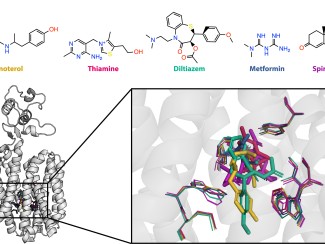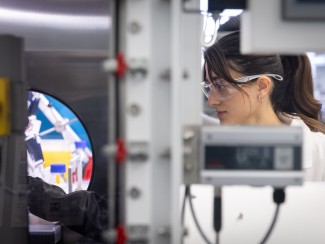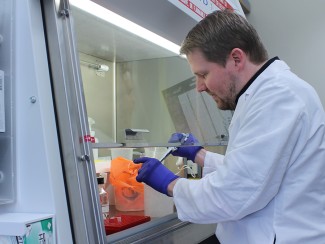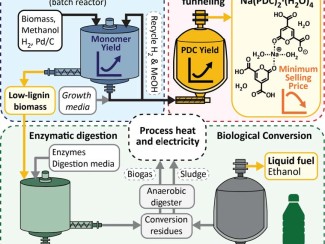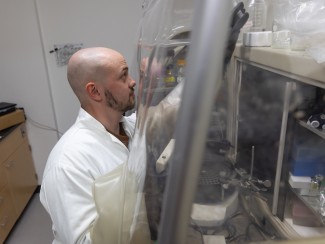Leveraging microbial communities to turn leftovers into valuable chemicals
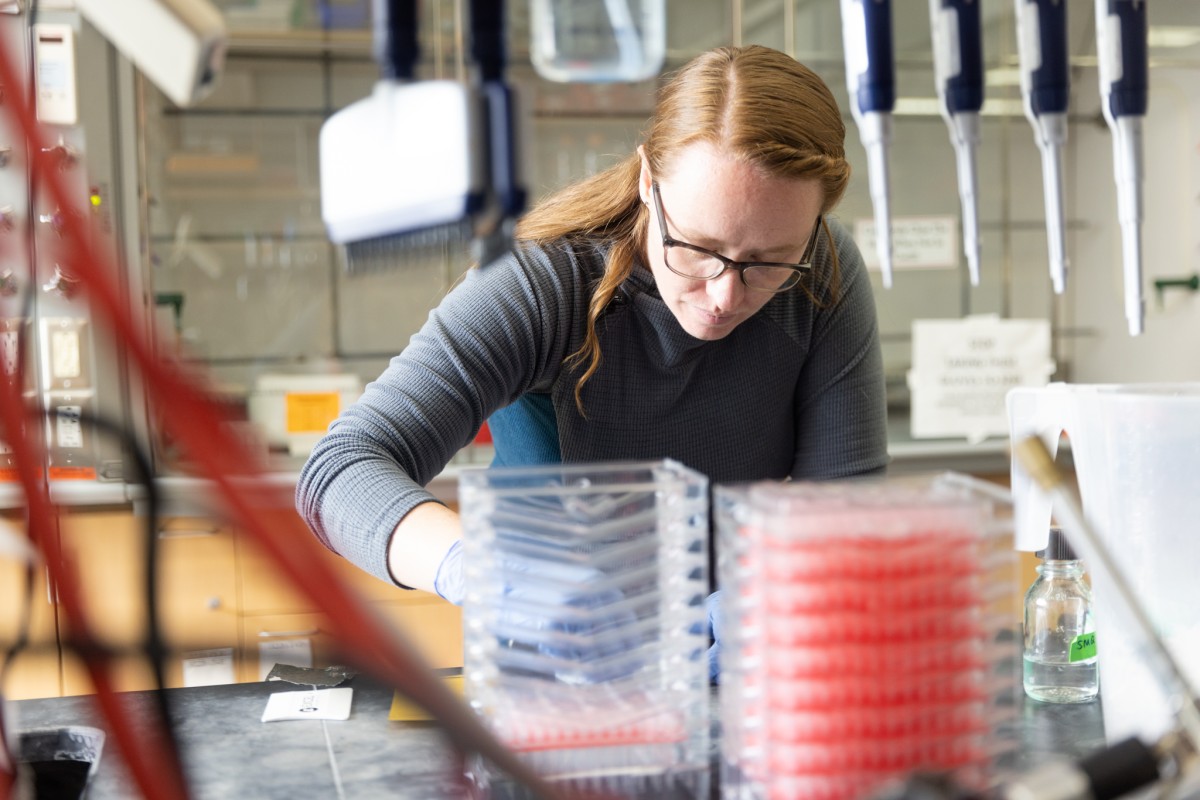
In this series, we learn more about what inspired our talented graduate students and postdoctoral researchers, what brought them to their field of study, and the questions that drive their work at the Great Lakes Bioenergy Research Center (GLBRC). Responses are edited for clarity and length.
Today we spoke to Madeline Hayes, a fifth-year graduate student in the Microbiology Doctoral Training Program (MDTP) at the University of Wisconsin–Madison and a member of the Venturelli Lab, where she studies microbial communities and how humans can leverage those systems to turn leftover plant materials into valuable chemicals.
Tell us about your research.
I work with bacterial communities. Most people know that there are bacterial communities all over the place. You have microbes that live in your gut; they are also closely associated with plants; you find them in the soil. And together microbial communities can do some really interesting chemistry that individual microbes might not be able to do by themselves.
My research goal is to use a microbial community to try and transform what is essentially a waste stream from biofuel production into valuable chemicals. Most people know that biofuel production is taking plant matter and feeding it to some microbe, usually yeast or a bacterium, to create bioethanol. But this process isn't 100% efficient. There's still carbon leftover after that process is complete. So I get the leftovers, the waste, and I'm trying to leverage bacterial community metabolism which might be able to more effectively break down the leftovers and turn them into other valuable chemicals. And we hope that by bringing this extra value to the process, we can increase the economic viability of biofuel production.
If you're looking for a type of chemistry, microbes have probably figured out how to do it.
Madeline Hayes
What motivates you?
I personally am pretty passionate about clean energy and sustainability. So understanding how to leverage naturally occurring systems to do the things that we want them to do and improve sustainable solutions is something that I really enjoy.
These bacteria exist in nature; they do these things on their own. It doesn't always require any special effort or engineering on our part other than to figure out how to put them together and provide them an environment in which they do the things that we find useful. So I like the idea of being able to just look in the environment for the functions that we want rather than trying to make things more complicated than they need to be. If you're looking for a type of chemistry, microbes have probably figured out how to do it.
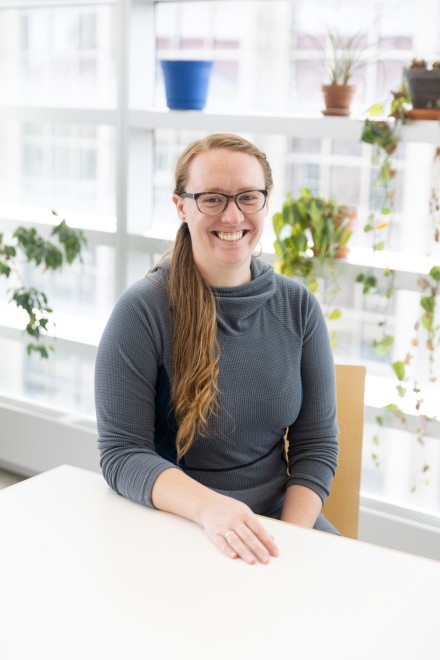
What do you wish more people understood about your field?
Microbes are in, on, and around all of us. And they are not necessarily something to be feared. They're not all bad for you. There are a lot of very good microbes in the world. And understanding how they work is good for all of us. Although there are disease-causing microbes, and they're a little bit scary, lots of microbes do really good things.
Understanding how individual microbes work together is not only specific to this type of chemical transformation that we're trying to achieve. It will help us understand microbial communities the world over. If you can understand a little bit more about how your gut microbiome functions, that will have applications for human health. And also understanding how microbes, in association with plants, work together or function can help us understand how to grow better food and understand the world around us.
What part of your work brings you the most joy?
There’s this one very particular moment when you're analyzing data, where you have just stumbled across the answer to something that you're trying to answer. And no one else in the world knows about it yet. That is always a really nice moment, even if it's not very good data or something went wrong. There's still that moment of anticipation that is like a crazy adrenaline rush where you're just like, “Show me what I want!” And then if it's really, really good, it's like, it's like a roller coaster ride.
When did you discover your passion for science?
I got to work in a research lab during my freshman year in college. I really wasn't sure if I was going to like it and decided that I could do one semester and have it pad my resume if I hated it. But it was super fun, and it was so different than any lab classes that I had ever taken. It was just very free and open ended. I could design experiments how I wanted to and make as many mistakes as I needed to. That's when I realized I wanted to go to graduate school and keep doing research, because it's so entertaining.
How did you end up studying microbes?
I started out as a microbiology major at Colorado State University and I worked with animal pathogens and human pathogens for about four years there. And then after graduating, I took a job here at UW–Madison in the Department of Plant Pathology, looking at bacterial pathogens of certain crops like tomatoes and potatoes. I got to keep working with bacterial pathogens, which was really nice, but I also got to start working in a new plant system, which was fun. And then after three years in that department, I started my PhD in the microbiology doctoral training program, and I joined a lab working with bacterial communities. So I don't work with host associated microbes anymore, I just work with anaerobic bacteria that we put in bioreactors, to see what we can do with them.
What attracted you to the microbiology program?
MDTP was just really inclusive and had a really broad range of trainers. It's not really associated with any one department and trainers from all of the (College of Agriculture and Life Sciences) departments on campus train for MDTP. So if you're looking for researchers that are looking at stuff that you might not be looking at in your lab, chances are, you'll be able to find someone in person on campus that can help you develop assays, and it's really easy to connect with other people in your cohort that are working on diverse systems.
Also Madison is a really fun town. It's the biggest city I've ever lived in, but it's not a very large place. And it feels kind of small town and a little bit homey. And the cheese curds.
I grew up in Frisco, Colorado, which is about 70 miles west of Denver. And that area has a very small town feel, so I was glad to find a city that didn’t feel overwhelmingly large. My mom taught skiing, so I kind of grew up skiing and doing ski school. And that was one hard thing about living here is there's not very much skiing, but I like still having snow and a real winter.
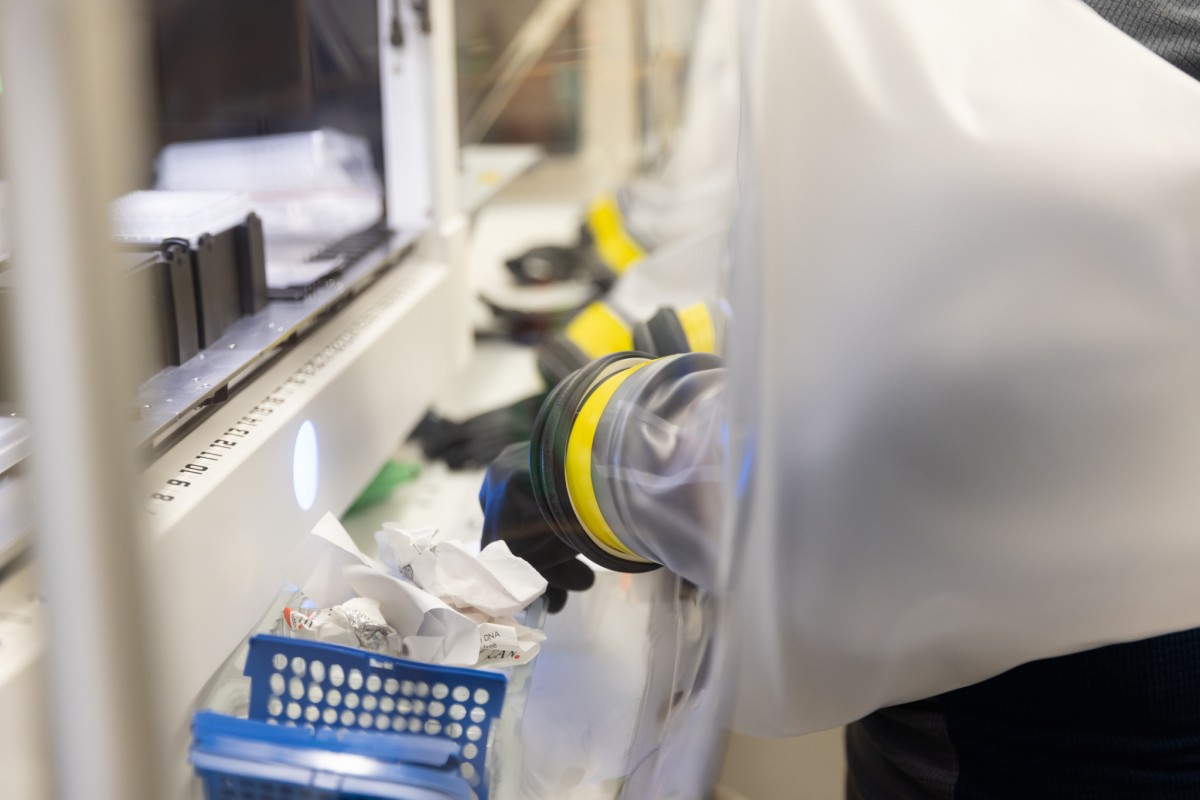
What previous skills helped prepare you for the work that you do now?
I have played the cello since I was about 10 years old. It takes a lot of strength in your hands and calluses on your fingers, and your shoulders have to be really strong to play for long periods of time. That hand strength and the fine motor skills and having endurance in your shoulders is really important for doing bench work, especially in the anaerobic chamber, where you're holding your hands up, and you have to be very careful. That’s definitely a niche skill that has become very translatable.
What advice do you have for future researchers?
For anyone who wants to get into biological research, if you're just starting out, or even if you're just thinking about going to graduate school, I would say take some computer coding classes. We used to be able to get away with not doing any computer programming. Everyone could analyze their data in Excel and make other figures in PowerPoint. But as the size of datasets increase and as data analysis gets more complicated, being able to use computer programming languages to do custom workflows, and analyze your data is super useful. And it's really hard to teach yourself how to code. I’m 100% self taught in coding. And I really wish that I'd had a basic introduction to Python or introduction to R class at some point in time because it would have saved me a lot of headaches.

